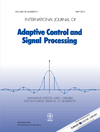
INTERNATIONAL JOURNAL OF ADAPTIVE CONTROL AND SIGNAL PROCESSING
Scope & Guideline
Unveiling New Horizons in Adaptive Control and Signal Processing
Introduction
Aims and Scopes
- Adaptive Control Techniques:
The journal emphasizes various adaptive control strategies, including model reference adaptive control, sliding mode control, and fuzzy adaptive control, aimed at enhancing system performance under uncertainties and disturbances. - Signal Processing Innovations:
It covers advancements in signal processing methods, particularly those that integrate adaptive algorithms for real-time data analysis and system identification, which are crucial for applications in communications and control systems. - Machine Learning and AI Integration:
There is a growing focus on incorporating machine learning and artificial intelligence techniques into adaptive control systems, facilitating improved decision-making processes and system automation. - Fault Detection and Diagnosis:
The journal addresses methodologies for fault detection and diagnosis in control systems, highlighting the importance of maintaining system integrity and performance in the presence of faults. - Multi-Agent Systems and Distributed Control:
Research on cooperative control strategies for multi-agent systems is prevalent, emphasizing decentralized approaches that allow for scalability and robustness in dynamic environments. - Event-Triggered Control:
The journal explores event-triggered control strategies that optimize communication between system components, thereby reducing bandwidth usage while maintaining performance.
Trending and Emerging
- Reinforcement Learning in Control:
The application of reinforcement learning techniques in adaptive control is gaining traction, highlighting the potential for systems to learn optimal control strategies through interaction with their environment. - Adaptive Control for Uncertain Systems:
There is an increasing emphasis on adaptive control techniques specifically designed for uncertain and nonlinear systems, showcasing the need for robust solutions that can handle real-world complexities. - Cyber-Physical Systems and Security:
Research focusing on the security of cyber-physical systems is on the rise, reflecting growing concerns about vulnerabilities in interconnected systems and the necessity for resilient adaptive control mechanisms. - Data-Driven Control Approaches:
The trend towards data-driven methodologies, including model-free adaptive control and data assimilation techniques, is becoming more prominent, enabling systems to adapt based on real-time data. - Event-Triggered and Networked Control:
Emerging themes around event-triggered control strategies and their applications in networked systems are increasingly common, emphasizing the efficiency of communication and control in distributed environments.
Declining or Waning
- Classical Control Techniques:
There is a noticeable reduction in publications focusing on traditional control methods, such as PID control, as researchers increasingly gravitate towards adaptive and intelligent control strategies that offer greater flexibility and performance in uncertain environments. - Basic Signal Processing Techniques:
The journal has seen fewer contributions on fundamental signal processing techniques, as the field advances towards more complex, adaptive, and machine learning-based approaches that address contemporary challenges. - Static System Models:
Research on static models for system identification and control is diminishing, with a shift towards dynamic, time-varying models that better capture the complexities of real-world systems.
Similar Journals
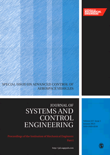
PROCEEDINGS OF THE INSTITUTION OF MECHANICAL ENGINEERS PART I-JOURNAL OF SYSTEMS AND CONTROL ENGINEERING
Driving Progress through Scholarly Collaboration and InnovationPROCEEDINGS OF THE INSTITUTION OF MECHANICAL ENGINEERS PART I - JOURNAL OF SYSTEMS AND CONTROL ENGINEERING is a prestigious journal published by SAGE Publications Ltd, dedicated to the fields of mechanical engineering and systems and control engineering. With an ISSN of 0959-6518 and an E-ISSN of 2041-3041, this journal has established a notable reputation since its conversion in 1991. It holds a solid Q2 ranking in both the Control and Systems Engineering and Mechanical Engineering categories as of 2023, placing it within the top cohort of its field based on Scopus rankings. This journal serves as a vital platform for researchers, professionals, and students, offering high-quality research articles, reviews, and technical notes that contribute to advancements in engineering practices and innovations. By focusing on the intersection of systems theory and mechanical applications, the journal aims to foster interdisciplinary collaboration and knowledge dissemination. As a premier outlet for scholarly work, it continues to drive progress in the engineering realm, ensuring the accessibility and relevance of cutting-edge research.
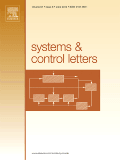
SYSTEMS & CONTROL LETTERS
Advancing the Frontiers of Systems and Control EngineeringSYSTEMS & CONTROL LETTERS is a prestigious journal published by ELSEVIER, dedicated to the advancement of knowledge in the fields of Systems and Control Engineering. With an ISSN of 0167-6911 and E-ISSN 1872-7956, this journal has become a cornerstone for academics and professionals alike, featured in the top quartile (Q1) categories for Computer Science (miscellaneous), Control and Systems Engineering, Electrical and Electronic Engineering, and Mechanical Engineering as of 2023. The journal encompasses a broad scope of interdisciplinary research and technological advancements, providing a forum for innovative ideas that can shape modern engineering practices. Despite being a subscription-based journal, its impact is underscored by significant Scopus rankings, with a notable placement in the 70th percentile for General Computer Science and consistent recognition across multiple engineering disciplines. With origins dating back to 1981 and converging through to 2024, SYSTEMS & CONTROL LETTERS continues to serve as an essential resource for researchers seeking to publish high-quality research, thereby fostering collaboration and knowledge dissemination within the engineering community.
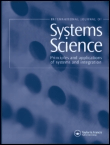
INTERNATIONAL JOURNAL OF SYSTEMS SCIENCE
Exploring the Frontiers of Systems EngineeringThe INTERNATIONAL JOURNAL OF SYSTEMS SCIENCE, established in 1970 and published by Taylor & Francis Ltd, stands at the forefront of research in the domains of Computer Science Applications, Control and Systems Engineering, and Theoretical Computer Science. With an impressive H-index and consistently ranked in the Q1 category across its relevant fields for 2023, this journal serves as a vital resource for researchers, practitioners, and students alike. It holds significant impact in the academic community with Scopus rankings placing it in the 86th percentile for Theoretical Computer Science and the 83rd percentile for Control and Systems Engineering. The journal's commitment to disseminating high-quality research fosters innovation and collaboration, making it an essential platform for advancing knowledge and application in systems science. Readers can access a wealth of articles that delve into both theoretical explorations and practical applications, thereby contributing to the ongoing dialogue in this dynamic field.
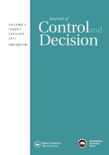
Journal of Control and Decision
Exploring the Intersection of AI and Human InteractionJournal of Control and Decision, published by Taylor & Francis Ltd, is a premier academic journal that serves as a vital resource in the interdisciplinary fields of control systems, artificial intelligence, optimization, and human-computer interaction. Established in 2014 and converging into its upcoming decade, the journal emphasizes rigorous research and practical applications, contributing significantly to both academic discourse and technological advancements. With an impressive categorization in various quartiles, notably Q2 in Control and Systems Engineering and Q3 in several other categories, the journal showcases high-quality contributions that enhance our understanding of complex decision-making processes. Although it currently does not offer open access options, the journal is committed to maintaining impactful scholarly communication, securing its position in Scopus rankings across multiple disciplines. Researchers, practitioners, and students are encouraged to engage with its rich content to foster innovation and knowledge sharing in these dynamic fields.

Journal of Control Automation and Electrical Systems
Connecting Theory and Practice in Electrical EngineeringThe Journal of Control Automation and Electrical Systems, published by SPRINGER, is a prominent academic journal dedicated to advancing research in the interdisciplinary fields of control systems, automation, and electrical engineering. With an ISSN of 2195-3880 and E-ISSN of 2195-3899, this journal has emerged as a vital platform for disseminating high-quality research, contributing significantly to both theoretical and applied aspects of these interrelated domains. As of 2023, it ranks in the Q2 and Q3 quartiles across multiple categories, including Electrical and Electronic Engineering and Energy Engineering, showcasing its relevance and impact in the field. Although not an open-access journal, it provides rich access options for research works, ensuring that findings reach a wide audience. Researchers, professionals, and students alike can draw valuable insights from its curated articles that explore emerging trends, innovative technologies, and practical applications, thus reinforcing its position as a key contributor to the advancement of control and automation systems.

Control Theory and Technology
Elevating Understanding in Aerospace and Signal ProcessingControl Theory and Technology, an esteemed journal published by SPRINGER MEDIZIN VERLAG GmBH, serves as a vital platform for the dissemination of cutting-edge research in the fields of control theory, systems engineering, and optimization. With an ISSN of 2095-6983 and E-ISSN of 2198-0942, this journal, which has been operational since 2014, reflects a strong commitment to advancing knowledge within various disciplines, including Aerospace Engineering and Signal Processing, as indicated by its impressive 2023 Scopus rankings and quartile placements. Positioned in Q2 and Q3 categories across multiple engineering and mathematical disciplines, the journal promotes rigorous peer-reviewed articles that explore innovative applications and theoretical developments. Although it does not offer open access, the quality and relevance of the content presented make it an essential resource for researchers, professionals, and students seeking to deepen their understanding and contribute to the rapidly evolving landscape of control technology.
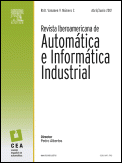
Revista Iberoamericana de Automatica e Informatica Industrial
Bridging Theory and Practice in Industrial InformaticsRevista Iberoamericana de Automatica e Informatica Industrial (ISSN: 1697-7912, E-ISSN: 1697-7920) is a distinguished open-access journal published by UNIV POLITECNICA VALENCIA, EDITORIAL UPV, since its inception in 2007. Based in Valencia, Spain, the journal aims to foster the dissemination of high-quality research in the fields of automation and industrial informatics. With a commendable impact reflected in its 2023 Scopus rankings—Q2 in Computer Science (miscellaneous) and Q3 in Control and Systems Engineering—it serves as a pivotal platform for innovative contributions from both established researchers and emerging scholars. The journal is committed to accessibility, ensuring that all articles are freely available to a global audience, promoting collaborative advancement in technology and engineering. Its coverage spans from 2007 to 2024, making it a valuable resource for those engaged in cutting-edge research and applications in the interdisciplinary landscape of computer science and engineering.

Systems Science & Control Engineering
Elevating Standards in Control Engineering Research.Systems Science & Control Engineering, published by Taylor & Francis Ltd, stands out as a premier open-access journal devoted to the advancement of control systems, optimization methodologies, and artificial intelligence applications within engineering. Since its inception in 2013, the journal has garnered a strong reputation evidenced by its impressive categorization in 2023, ranking Q2 in Artificial Intelligence and achieving Q1 status in both Control and Optimization and Control and Systems Engineering. With a Scopus ranking that places it among the top tier of its fields—being positioned 7th in Control and Optimization—this journal serves as an essential resource for researchers, industry professionals, and students who are seeking to publish high-quality research and stay abreast of innovative developments. The journal emphasizes the integration of theoretical frameworks with practical applications, aiming to foster interdisciplinary collaboration and stimulate future research directions in systems science.
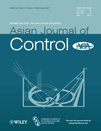
ASIAN JOURNAL OF CONTROL
Pioneering Advances in Engineering Control TechnologiesWelcome to the Asian Journal of Control, an esteemed publication in the fields of Control and Systems Engineering as well as Electrical and Electronic Engineering, published by WILEY. With a continuous convergence from 2000 to 2024, this journal serves as a vital platform for researchers, professionals, and students, offering high-quality peer-reviewed articles that drive innovation and advancement in various control strategies and systems. The journal is renowned for its rigorous academic standards, reflected in its impressive Scopus rankings, with a percentile of 90th in Mathematics (miscellaneous) and 67th in Engineering Control and Systems. Although it does not currently offer open access, the Asian Journal of Control remains an indispensable resource for those looking to push the boundaries of knowledge in engineering disciplines. With its Q2 category ranking in both relevant fields, the journal is poised to influence future research and applications, making it a must-read for those invested in the evolving landscape of control technologies.

JOURNAL OF THE FRANKLIN INSTITUTE-ENGINEERING AND APPLIED MATHEMATICS
Advancing the frontiers of engineering and applied mathematics.JOURNAL OF THE FRANKLIN INSTITUTE-ENGINEERING AND APPLIED MATHEMATICS, published by Pergamon-Elsevier Science Ltd, stands as a premier platform for disseminating cutting-edge research in the fields of applied mathematics, computer networks and communications, control and systems engineering, and signal processing. Established in 1826, this esteemed journal carries a rich heritage of scholarly contributions and continues to be influential, evident in its 2023 recognition as a Q1 journal across multiple research categories. With its commitment to advancing knowledge and innovation, the journal invites researchers, professionals, and students to engage with a diverse array of rigorous studies designed to push the boundaries of engineering and applied mathematics. Although open access options are currently unavailable, the journal maintains a robust publication standard, ensuring that each article undergoes a meticulous peer-review process. By contributing to the JOURNAL OF THE FRANKLIN INSTITUTE, authors can enhance their visibility and impact within the global academic community, solidifying the journal’s role as a cornerstone of research and development.